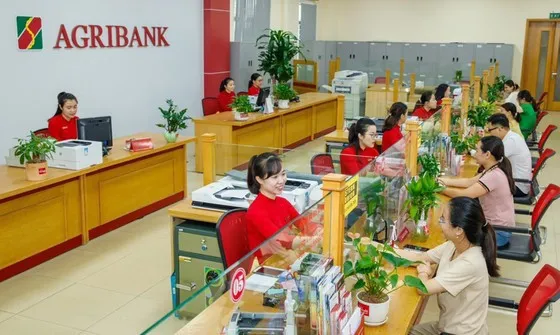
Prioritizing Green Projects
With a vision of forging a green, circular, and environmentally-conscious economy, Agribank is concentrating on prioritizing funding sources and proficiently extending credit to projects and programs geared towards enhancing production and business activities in agriculture and rural areas. Emphasis is placed on programs and projects that generate added value, promote clean energy, and cultivate high-tech agriculture.
In recent times, the Bank has actively engaged in numerous environmentally-driven projects sponsored by the World Bank (WB) and financial institutions. These initiatives encompass endeavors to enhance the quality and safety of agricultural products, implement biogas programs, foster coastal resources for sustainable development, manage natural disaster risks, support low-carbon agriculture, provide clean water supply and rural sanitation in the Red River Delta, promote wind electricity generation, and combat drought and saltwater intrusion in the Mekong Delta and Central Highlands provinces.
Since 2016, Agribank has been implementing a preferential credit program, with a minimum scale of VND 50,000 billion and unlimited capital allocation, dedicated to supporting "clean agricultural" production for public health. The program extends credit to businesses, cooperatives, cooperative unions, farm owners, and other entities involved in all stages of the secure, large-scale agricultural production chain, offering interest rate reductions of 0.5-1.5% per annum. To date, Agribank's lending for clean and high-tech agricultural endeavors has surpassed VND 25,000 billion, constituting 50% of the total investment capital in this sector. Outstanding loans in this category have reached VND 12,000 billion, benefiting over 43,000 customers, including individuals, farm owners, and cooperative groups.
Agribank's green credit portfolio has maintained steady growth year after year. Between 2018 and 2020, the green credit balance surged by an impressive 100-350% annually. Although the growth rate of outstanding loans tapered off slightly after this period, it remained relatively stable in terms of both loan value and customer count. By December 31, 2022, Agribank's green sector loans amounted to nearly VND 12,000 billion, accounting for roughly 1% of the total outstanding loans within the economy. This was accompanied by over 41,000 loan customers. Among these, sustainable forestry accounted for VND 6,192 billion, constituting 52% of the total outstanding green credit debt and marking a 7.8% increase compared to 2021. Renewable and clean energy came in second, with outstanding loans reaching VND 2,803 billion, equivalent to 23.6% of the total outstanding green credit loans. Green agriculture followed closely with outstanding loans of VND 1,989 billion, comprising 16.7% of the total outstanding green credit loans.
Through the allocation of Agribank's capital, numerous large-scale agricultural production models employing advanced technologies have materialized throughout the country. Examples include climate-controlled greenhouses using French technology, multi-layer farming based on Singaporean technology, greenhouse production technology, and intelligent irrigation systems employing Israeli technology.
These Agribank-backed models have yielded tangible results, including vegetable, flower, and fruit cultivation models in Lam Dong, expansive sample fields in Can Tho, livestock farming in Bac Ninh, Lao Cai, and Ha Nam, investment in agriculture machinery and equipment in Tien Giang and Long An, shrimp breeding in Kien Giang, Ninh Thuan, and Binh Thuan, orchid cultivation and dairy cow farming in Cu Chi and Kon Tum, sugarcane cultivation in Khanh Hoa and Tuyen Quang, corn production in Son La, and the production of safe fruits and vegetables in the Central Highlands provinces of Dak Nong and Kon Tum. Additionally, there are projects for dragon fruit cultivation adhering to VietGap standards in Binh Thuan.
Charting the Course for the Future
Building on the foundation of Vietnam's National Strategy on Green Growth for 2021-2030, with a vision extending to 2050, as well as the National Action Plan for Green Growth for 2021-2030, and the Bank Development Project for green banking in Vietnam, Agribank is resolute in effectively deploying measures to champion green credit, green banking, and support sustainable development. Key strategies include:
Comprehensive and effective implementation of ESG (Environmental, Social, and Governance) practices within the Agribank system. This involves crafting a set of ESG policies, defining specific objectives, and devising both short- and long-term implementation roadmaps to create a conducive environment for green credit, green banking, and the attraction of green and sustainable international capital sources. Furthermore, efforts will be made to refine the organizational model and delineate the functions and responsibilities of pertinent units responsible for ESG implementation.
Prioritizing the provision of capital and financial services for the development of agriculture, rural areas, and farmers. Agribank is committed to maintaining the proportion of outstanding loans allocated to agriculture and rural areas within the range of 65-70% of the total outstanding loans.
Research and deployment of green credit products, the formulation of preferential policies, and the encouragement of lending to projects and business plans that are effective and environmentally friendly. These initiatives will align with business strategies, customer segments, target markets, and Agribank's own capabilities and strengths.
Proactive exploration and access to green international capital sources through key ministries, government departments, financial institutions, non-governmental organizations, Green Credit Trust Funds, and other avenues. Agribank is prepared to issue green bonds to raise capital for green projects.
Fostering the development of financial products and services designed to support agricultural and rural production and businesses, small and medium-sized enterprises, cooperatives, and production and business households. There will be continued emphasis on developing a diverse array of modern and user-friendly financial and banking products and services, leveraging digital technology applications to promote non-cash payments across the economy. This will contribute to "greening" the banking industry and inculcating environmentally friendly habits among customers as they access and utilize banking products and services.




















